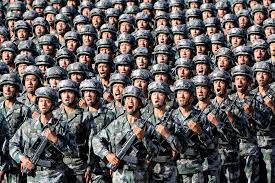
STRATEGIC ASSESSMENT- The conflict in Ukraine also serves to provide unique insights for the CCP about what a likely Western response to any military takeover of Taiwan could look like.
Over a week into the Russian invasion of Ukraine, the war has raged on, spurring the most serious humanitarian crisis in Europe since the wars in the Balkans in the 1990s. An increasing number of states have rallied behind Ukraine and condemned Russia’s actions. On March 2, 2022, the UN General Assembly voted to condemn Russia’s invasion of Ukraine in a groundbreaking 141 to 5 vote with 35 abstentions, with many traditional Russian allies declining to support them and highlighting the increased isolation of Putin’s pariah state.
The United States and allies have enacted crushing sanctions on Russia while sending both lethal and humanitarian aid to Ukraine. The People’s Republic of China (PRC), however, continues to walk a tightrope, neither outwardly condemning nor supporting Russia over the war in Ukraine. Russia’s unprovoked war on a sovereign nation has created a dilemma for the PRC, pitting its long-standing foreign policy championing sovereignty, territorial integrity and “non-interference” against the growing strategic partnership between Beijing and Moscow. Still, the positives are likely to outweigh the negatives for the Chinese Communist Party (CCP).
Since the start of Russia’s war in Ukraine, the PRC has been careful not to appear supportive of an invasion – in part by refusing to acknowledge and calling it by terms used by the Kremlin, a “situation” or “special military operation” – while still talking about de-escalation and dialogue. Its official stance appears to be edging towards a mediating role.
A read-out from the call between the foreign ministers of Ukraine and the PRC on March 1, suggests China may be angling to take a leading role in negotiations—a narrative the PRC also pushed following the call between Chinese leader Xi Jinping and Russian President Vladimir Putin on February 25.
This is not a unique foreign policy approach for China, which has sought to establish itself in negotiating roles in other conflicts, such as the civil war in Syria and the Israeli-Palestinian conflict. Attempting to be perceived as a neutral champion of diplomacy serves the PRC’s goals of enhancing its reputation as a responsible global power—which Beijing suggest is antithetical to the United States.
The PRC’s true intentions should be interpreted by its actions rather than the image Beijing attempts to shape at home and abroad. The PRC’s censorship apparatus has been busy since February 24, taking down hashtags and Chinese accounts that are condemning the war in Ukraine and expressing concern about human suffering. Meanwhile, China has allowed accounts that propagate narratives focused on framing the war in Ukraine as something provoked by the United States and “NATO expansion.”
The PRC state-backed media outlets and PRC-aligned (possibly even backed) disinformation networks have even parroted Russian disinformation, for example suggesting Ukrainian President Volodymyr Zelensky had fled the country. The PRC has firmly stated that it will not join in Western-led sanctions against Russia and has abstained from UN Security Council and UN General Assembly votes on Russia’s aggression in Ukraine.
Russia’s war in Ukraine has presented the PRC with some major foreign and domestic policy challenges—especially as it related to the fate of around 6,000 Chinese nationals in Ukraine. Domestic audiences in China have expressed worry and outcry over their citizens abroad.
Some reports suggest Russia’s invasion of Ukraine may have caught the PRC off guard, while others suggest U.S. intelligence was shared with the CCP leadership in an attempt to have Xi dissuade Putin from following through with the invasion. The New York Times, citing Western intelligence officials, reported that Xi was aware of Putin’s plans and simply asked him to delay the invasion until the Winter Olympic games, hosted by China, concluded.
Whatever transpired at the highest level of the CCP leading up to and during the first days of the invasion, the PRC has illustrated that it will never let a good crisis go to waste. Experts have argued that the PRC prefers stability in Europe and that the war in Ukraine poses challenges to Beijing’s foreign policy goals on the continent. But now that war is reality, the CCP is likely calibrating its foreign and domestic policy to reap both short-and long-term benefits from a war in Europe. In light of this, it behooves Washington and Western allies to take advantage of opportunities to fend off a stronger Sino-Russian entente and reaffirm solidarity among NATO and its allies.
Russia’s war on Ukraine will likely ultimately provide a net-positive for the PRC for several reasons, ranging from greater Russian economic dependence on China and the possibility of a financial system that is less reliant on the dollar, to diverting the U.S. and allies from the Indo-Pacific to Europe. The conflict in Ukraine also serves to provide unique insights for the CCP about what a likely Western response to any military takeover of Taiwan could look like.
The CCP is likely to take note of the Western resolve that has been on display, including coordinated sanctions and military assistance and materiel to information warfare and the rapid declassification of relevant intelligence to preempt Russian disinformation campaigns and false flag attempts. In addition, an important feature of Ukraine’s resistance has been the country’s sense of a national identity and its political leadership.
The CCP is likely to take note and favor measures to erode and undermine Taiwan’s national identity and political leadership through a variety of economic, political, and influence tactics (TSC)





